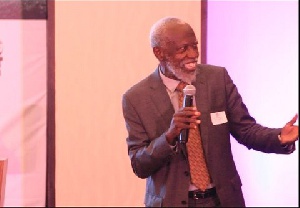Professor Stephen Adei, a former Rector, Ghana Institute of Management and Public Administration (GIMPA), has called on the Ghana Broadcasting Corporation (GBC) to desist from using prime time to sell alcoholic beverages.
“I have been hearing some of my respected men of the cloth advocating for the payment of TV license as a national responsibility. I have mine for two years now. We must, however, also let GBC know that it is also its national irresponsibility not to use prime time to sell alcoholic beverages. It is a health hazard,” Prof Adei said.
Prof Adei made these remarks in his presentation at the at the climax of Christian Health Association of Ghana’s (CHAG’s) golden jubilee celebration at the Pentecost Convention Centre, Millennium City at Kasoa in the Central Region.
The yearlong celebration was held under the theme: “50 Year of Christian Health Services; Lessons and Pointers for the next 50 Years”.
Prof Adei called for a strong effort to tackle the menace of drugs and alcohol abuse, especially among the youth.
“That is why I find it sickening for GBC to use prime time of news to sell adonko bitters amongst others to such an extent that adonko bitters have become the signature tune for some primary school pupils,” he said.
“We cannot and should not pay TV licenses which I strongly advocated to GBC for them and at the same time to use our national media to sell alcohol, cigarette and other health hazards, drugs and drinks,” he said.
Speaking on the topic: “Exploring Innovations for Sustainable Health Services in Ghana”, Prof Adei said: “It does not take much to know that our public health situation in Ghana is in bad shape and requires urgent attention”.
“For one the sanitation situation is such that we can no longer continue to discuss it. It is time to act forcefully, decisively and collectively to improve the situation,” he said.
“I just heard on television a few days ago that Gambia has banned the use of plastics in the way we use it for sachet water, food wraps. We must gather the political and moral will to address this menace,” Prof Adei said.
He noted that the President had promised to make Accra the cleanest city in Africa but it would require a combined national effort aimed at regulation, law enforcement and discipline to clean not only our behind but this time our front and sides.
“The President will go down in history as a hero if he leads in finding lasting and sustainable solution to our public health challenges especially sanitation and galamsey along with quality basic and secondary education in the country,” he said.
On CHAG’s contributions to the nation’s healthcare delivery system, Prof Adei said: “I want to thank you on behalf of the many millions of Ghanaians who have been the beneficiaries of the work of the services of members of CHAG over the years.
“Even as a child in my ’holy’ village of Hwiremoase, I knew of Battor when it came to optical services and Agogo for general medical care long before I knew where in the country the towns were located because of the reputation of the medical services offered by Christian medical personnel at these centres.”
Mr Peter K. Yeboah, the Executive Director of CHAG, said the institution was dedicated to saving lives and livelihoods and promoting health and healing to millions of people; it becomes obligatory to celebrate achievements, recognize challenges and renew vows with joy and introspection.
He said CHAG was located in all the 10 Regions of Ghana, and in about 188 Districts and Municipalities of Ghana.
“In not too distant future, we will be in each District; hence One District, One CHAG Hospital shall become a reality,” he said.
“We are committed to providing holistic health services to the human person irrespective of socio-economic circumstances. Our Mission mainly is to promote Jesus Christ’s healing ministry,” he said.
Mr Yeboah said CHAG fulfils this core mandate by providing holistic health care to all manner of people irrespective of socio-economic circumstances.
Mr Agyemang-Manu, the Minister of Health, represented President Nana Addo Dankwa Akufo-Addo at the event.
CHAG is a network organisation of 302 health facilities and health training institutions owned by 25 different Christian Church Denominations.
CHAG provides health care to the most vulnerable and underprivileged population groups in all 10 Regions of Ghana, particularly in the most remote areas.
General News of Monday, 6 November 2017
Source: ghananewsagency.org













